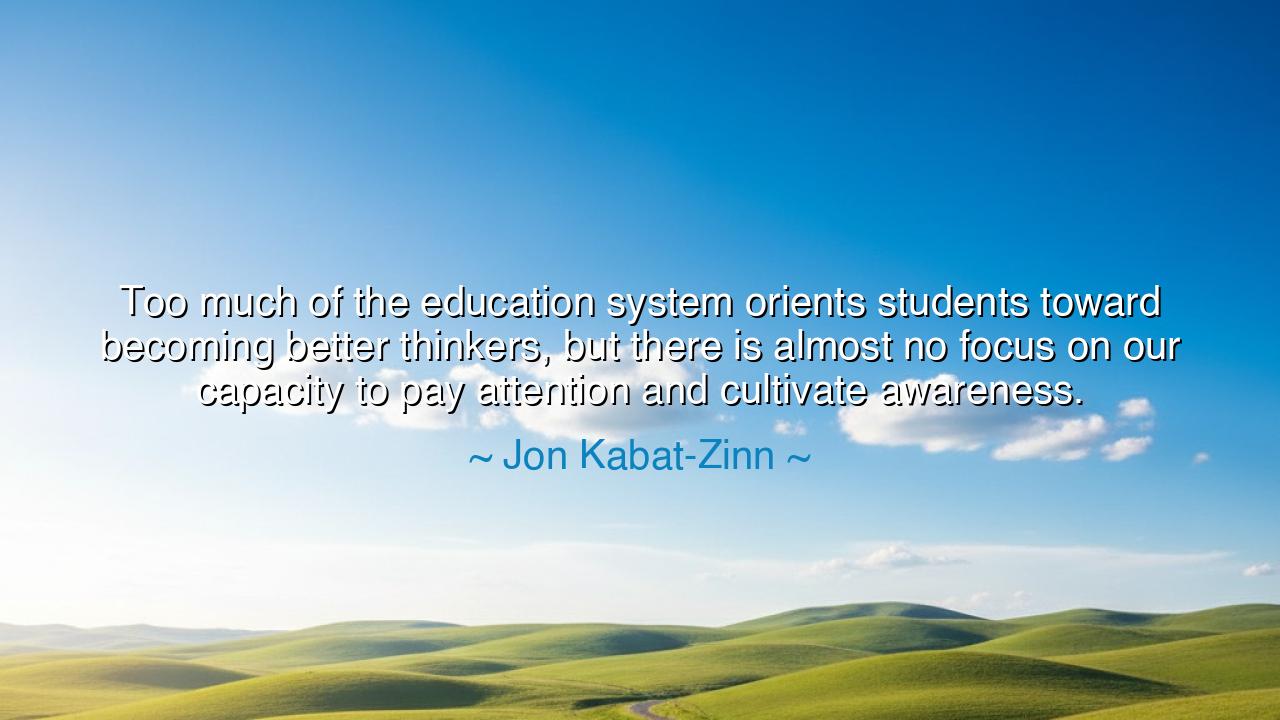
Too much of the education system orients students toward becoming
Too much of the education system orients students toward becoming better thinkers, but there is almost no focus on our capacity to pay attention and cultivate awareness.






In the words of Jon Kabat-Zinn, “Too much of the education system orients students toward becoming better thinkers, but there is almost no focus on our capacity to pay attention and cultivate awareness.” These words rise like a morning bell in a monastery, calling the soul to awaken from its restless sleep. For in the modern halls of learning, the mind is trained to race — to analyze, to solve, to conquer — yet seldom is it taught to be still. Thinking has become the master, and awareness its forgotten servant. But the wise of all ages knew that before one can think clearly, one must first see clearly.
In the ancient East, the sages taught that attention is the root of all wisdom. Before writing, before speech, before even reason itself — there was the still gaze of awareness, the silent witness of life. The mind, untrained in presence, is like a wild horse: swift, powerful, yet directionless. It may carry its rider far, but rarely where he truly wishes to go. The education of the modern age exalts the cleverness of the intellect but neglects the discipline of attention, that sacred art of being fully here, now, in the living moment. Kabat-Zinn, like the seers of old, calls us back to this lost balance between thought and awareness.
Consider the life of Prince Siddhartha, who would become the Buddha. Born into privilege and educated by the finest teachers, he mastered philosophy, art, and reason. Yet despite all his learning, he found no peace. His mind was filled with thoughts, but his heart was restless. Only when he turned inward, sitting beneath the Bodhi tree in silent awareness, did wisdom dawn upon him like the morning sun. He did not think his way to enlightenment — he awakened to it. Thus, his story stands as a timeless reminder: to know life, one must first be present in it.
In our age of endless noise, where every child’s mind is flooded with information, the power of awareness is more vital than ever. We have taught generations how to think faster, to compete harder, to outsmart the world — but not how to listen to the quiet voice within. A student may learn every theorem, every law, every historical date, yet still be blind to the wonder of a single moment — the sound of rain, the breath between thoughts, the heartbeat of life itself. What good is sharp thinking if one’s awareness is dull? What good is the mind’s brilliance if it shines upon nothing real?
The ancients of Greece, too, knew this truth. Socrates said, “An unexamined life is not worth living,” and by this he meant not the endless dissection of ideas, but the turning of attention inward — the act of truly seeing oneself. For without awareness, thought becomes empty argument, clever words upon a wind that carries them away. True education, therefore, is not the feeding of facts to the brain, but the awakening of the whole being — mind, heart, and spirit united in still attention.
To cultivate awareness is to remember that we are not only thinkers, but perceivers; not only problem-solvers, but beings capable of wonder. When one learns to pay attention — deeply, reverently, without haste — the world becomes luminous. Every act, from breathing to speaking, becomes a meditation, a mirror reflecting the divine rhythm of existence. This is the path of wisdom that Kabat-Zinn calls us to reclaim — not the path of endless analysis, but of presence.
So, dear listener, if you would walk in wisdom, train not only your mind, but your awareness. Sit in stillness each day; watch your breath as though it were the tide of the sea. When you eat, taste fully; when you listen, listen wholly; when you speak, do so from the heart. In this way, life itself becomes your teacher, and every moment, your lesson.
For in the end, as Kabat-Zinn reminds us, thinking is but one wing of the bird — the other is awareness. Only when both move in harmony can the soul take flight.






AAdministratorAdministrator
Welcome, honored guests. Please leave a comment, we will respond soon